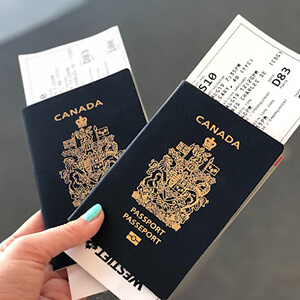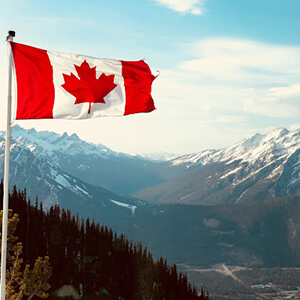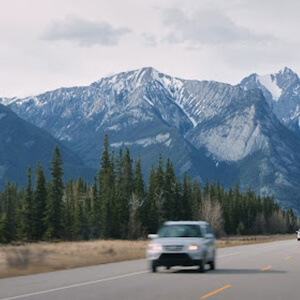Your Guide to Moving to Canada from the UK
Immigration to Canada is available through a number of different routes. As international relocation specialists, we have put together a guide to help you when moving to Canada. It is important to make sure you know everything there is to know about visas and entry requirements to the country. Our guide walks you through these steps but also provides more detail on the culture, where to live, the cost of living in Canada, and lots of other information you might be keen to learn.
Quick Canada Facts
- Population: 38.93 million
- Language: English and French
- Capital City: Ottawa
- British Expats: 531,584
- Time Zones: 6
What To Know About Immigrating to Canada
If you are planning on moving to Canada, the first thing to consider is the length of your relocation. You can move to Canada temporarily for work or study through applicable visas, but moving to Canada as your permanent residence is more difficult and will require you to meet certain criteria.
How to Move to Canada from the UK Permanently
You can move to Canada from the UK permanently using their immigration system, based on points earned through family connections, your skills, or qualifications you can prove to the government. The most common way to move to Canada from the UK is through a Skilled Worker Visa. You can also gain residency through family members and other routes. The most common routes include:
- Federal Skilled Worker: Ideal for those with proven work experience outside their home country.
- Federal Skilled Trade: For people qualified in a skilled trade, able to prove a qualification or a job offer in that field.
- Canadian Experience Class: Designed for those with Canadian work experience under their belt.
- Provincial Nomination Program: This is a more province-specific skilled worker visa route.
- Family Class: This is a route into Canada for those with family relations already in Canada.
What Do I Need to Move to Canada?
When moving to Canada, it is crucial to make sure that you are being compliant with its unique laws and requirements. A current passport is needed and has to be valid for the whole duration of your stay. A visa will also be required, including a work permit and authorisation to import your car or home belongings if you wish to do so. If in any doubt, your employer should provide you with assistance. You can read more about the visa, travel authorisation, and Immigration services specific to Canada’s requirements.

Learning the Language
The two predominant languages in Canada are English and French, and it is strongly recommended to learn them both if you are planning on moving to Canada for work or on a permanent basis. There are several different ways you can go about learning Canada’s languages. The Languages Canada programmes are a great option, and many schools can support learning the languages if you are bringing children with you to Canada. Note that French spoken in Canada may differ slightly from that spoken in mainland France.
Canadian Time Zones
Canada is well–known for being an extensive country. It spans six different time zones, including Newfoundland Standard, Atlantic Standard, Eastern Standard, Central Standard, Mountain Standard, and Pacific Standard. Find out more about what time zone you might be moving to in Canada.

Customs Requirements
Transferring your goods to Canada is relatively easy – although there will be a variety of charges and formalities to deal with. Make sure to avoid bringing prohibited items such as handguns and pay close attention to restrictions on plants, meat, seeds, and syringe imports. If you arrive with over $10,000 in cash, also be prepared to declare it to the authorities. For further questions, you can contact CBSA – Canada Border Services Agency.
Taking my Pet
Many of us have four-legged family members who can often bring a lot of anxiety when relocating abroad. To put you at ease, Canada offers a lot of services to support pet owners. You should, however, keep in mind that the climate in Canada is very different to that of the UK, with winters often reaching temperatures well below 0℃. Make sure that your pet is healthy enough to deal with and adapt to extreme cold weather.
Once you have agreed to bring your pet with you, make sure that cats and dogs have a Health Certificate issued a week before travel. They should also have an original certificate of rabies vaccination and wear identification and rabies vaccination tags. For any other information about bringing your pets to Canada, check out the Canadian government website.
Taking a Vehicle to Canada
As previously mentioned, Canada is huge. Because of that, having a car can be extremely convenient. Given its more extreme climate and cold winters, you are best off with a four-wheel-drive car or, at the very least, a car with excellent snow tyres. If you already have one of these at home, you might be considering bringing it with you. Make sure to check with your employer first and if you manage to get a green light, you will need to know the following:
- The vehicle has to meet Canadian safety requirements and emission standards
- The vehicle has to be at least one year old – Canada prohibits current-year car imports
Currency
The Canadian dollar is the national currency of Canada. Cents (¢) include a nickel (5¢), dime (10¢), quarter (25¢), half a dollar (50¢), dollar (C¢1), and two dollars (C¢2).
Canadian money can be purchased at Canadian banks, airports, hotels, and travel agencies, or you can opt to take advantage of our International Money Transfers.
Healthcare in Canada
To benefit from Canadian medical services, you will need to get a Social Insurance Number upon entry. Be prepared to show the immigration officer your employment authorisation and order of employment forms. After that, you should receive forms requesting proof of identity which, once filled in, will allow you to obtain a SIN. For more information, visit the Service Canada Centre.
Finding a home in Canada
Like everywhere else, real estate agents are there to help you find a rental or to purchase a property on Canadian soil. Unsure of what option to go for? Learn more about mortgages and rentals in Canada to make an informed decision.
If you’re moving to Canada temporarily, short-term rental is ideal. It is offered in many Canadian cities, suburbs, and even rural areas, and is available for durations between one day to over a year. You’ll often be able to find short–term rentals that are either furnished or unfurnished so that the accommodation can meet your specific needs.

Where to live in Canada?
- Calgary – furnished property is difficult to find and the costs are relatively high.
- Edmonton – high availability of both rental and mortgage properties, though costs in the area are beginning to rise.
- Halifax – this and surrounding cities Dartmouth, Bedford, and Sackville are popular with expatriates. There is a ferry service between the towns and a wide diversity of new builds and older homes.
- Montreal – affordable accommodation, with a particular focus on new-build complexes.
- Ottawa – great area for rental properties, with various property types at a lower price.
- Toronto – Canada’s most expensive city, with high accommodation costs and difficulty finding a furnished property.
- Vancouver – East Vancouver has a good variety of houses, however, commuting can be difficult. West End mainly has one to two-bedroom apartments with limited space. These often prohibit children and pets.
Getting Around in Canada
One of the perks of moving to Canada is the country’s excellent road network. The regions are well-connected, offering great connectivity and ease of access. Canada, however, is a vast country, and the winters here are often extreme, so having a car is recommended. You can opt for public transport, but it is very limited in the far north and can be inconvenient in many major cities.
Driving Conditions
Canada is one of the best-rated countries in the world for road safety, with the lowest fatality rates in North America. Due to the extreme weather, it is key for expats to familiarise themselves with winter driving conditions – including the potential of whiteouts and black ice. Moreover, distances on roads are mainly displayed in kilometres – something to familiarise yourself with if you hail from a country that makes more regular use of miles.
Driver’s Licences in Canada
Did you know that it is illegal to drive in Canada without a driving licence? You are also expected to carry your vehicle registration, permit, and insurance certificate at all times. Depending on the area you are staying in, your national country licence will only be valid for anywhere between 30 days to 6 months. Therefore, you should obtain a local licence within the given timeframe of your destination. Make sure to schedule your test early in advance as the testing centres tend to be booked out.
Vehicle Insurance
Upon entry to Canada, your vehicle has to be insured. Depending on your home country, insurance may or may not be valid, therefore, make sure to check with your provider before leaving.

Settling Into Canada
British expats moving to Canada often favour it due to the positive work-life balance Canada’s residents enjoy. The country’s socio-cultural scene is diverse and lively with recreational pursuits ranging from ice hockey to river rafting. Furthermore, with a strong expat community and cultural events such as the Stratford Festival, it’s not going to be easy for Brits to feel homesick in Canada.
Expatriate Community in Canada
There are a wide variety of expatriate communities in Canada. Sign up for a local civic organisation, place of worship, a club, or get involved with school projects to meet fellow expatriates. Alternatively, join the Newcomers Association, which has now spread to most areas of Canada.

Social Life
Your social life upon moving to an entirely new country can make or break your assimilation. Therefore, it’s key to be prepared to put yourself out there. There is a lot to do and see in Canada – including community leisure activities, camping and hiking in 38 national parks, or sightseeing at 131 natural historic sites. Depending on your location, we highly recommend Gatineau Park in Montreal, Ontario Science Centre in Toronto, and Glenbow Museum in Calgary.
Canada’s National Sport
Sport is a big part of life in Canada, and there’s no shortage of different sports to enjoy. Canada’s national sports are split into summer and winter seasons. Ice Hockey is the Canadian winter national sport – with Canada being crowned the gold medallist. Lacrosse is the summer national sport, with evidence suggesting that Canadians first played it over 500 years ago.
Religious Worship
Given the diversity of Canada, there are plenty of places of worship in all major towns. Whether you are Muslim, Christian, Catholic, Jewish, or have any other faith, there will be a place of worship available, or at the very least – a like-minded group you can meet up with.
Social Customs
Greetings vary in different areas of Canada – anywhere from “Hello” to “Bonjour” or even “Salut”. When meeting someone new, it is expected to greet them by their title and last name, until the most senior person of the group greets them by their first name. There shouldn’t be many social norms that appear out of the ordinary when moving from the UK.
Alcohol and Drinking
It is rare to indulge in alcohol during a meeting or a business lunch in Canada. When drinking socially, a good rule is to follow your host to make sure that you are being respectful. Also, keep in mind that the legal drinking age is 19 in Canada, with the exception of Alberta, Manitoba, and Quebec where it is 18. Overall, consuming alcohol responsibly is a friendly and social part of life in Canada.

Tipping
When dining out in Canada, tips are generally not factored into the final bill, however, customers are expected to pay around 15% of the total bill in tips. Tips are an important part of the income for service workers in Canada, and in some areas, waitstaff have a separate minimum wage which is actually lower than the regular minimum wage. This means that if you don’t tip, servers and other hospitality workers aren’t earning as much as they should be.
Gestures and Body Language
In such a big country, you should expect differences in how people communicate across the different provinces. Depending on where you are in Canada, people might be more or less expressive. Those from Quebec tend to gesticulate more. Moreover, direct eye contact is key to conveying sincerity and is expected.
Avoid pointing at someone with an index finger or using the “thumbs down” gesture – as both of these are considered offensive.
Etiquette
In Canada, you are expected to treat the elderly and women with respect. This might include offering a seat on public transport and addressing the elderly by their title and last name only. Also, make sure to give Canadians personal space and avoid physical contact when chatting. If you are bilingual, it is considered rude to speak another language around those who do not understand it, so try to stick with English or French instead.
Get Ready for an Exciting Adventure in Canada
Moving to Canada offers an exciting opportunity for a fresh start in one of the world’s most welcoming and diverse countries. From securing the right visa to navigating the housing market and understanding the healthcare system, preparation is key to making your transition smooth and successful. Whether you’re seeking new career prospects, educational opportunities, or a high quality of life, Canada has something for everyone. With careful planning and the right resources, you can make your move a positive and fulfilling experience, settling into a country renowned for its natural beauty and vibrant culture.
Best of luck in your Canadian adventures! If you’re moving with your family, we have some valuable tips to help you prepare for your international relocation. Find out more on our blog.
Interested in information on another country? Take a look at our other International Relocation guides.
Great Customer Experiences start here.
Very pleasent and helpful. Nothing too much trouble.
Mr M H moved from London, UK to Toronto, Canada
Very helpful and patient even when things got packed that we had to get out again!
Mr M E moved from Enfield, UK to Dorset, UK
Thanks to Graham, Nick and the entire crew!
Mr C D M moved from UK to Singapore
Friendly and helpful crew.
Ms T W moved from USA to Cambridgeshire, UK
